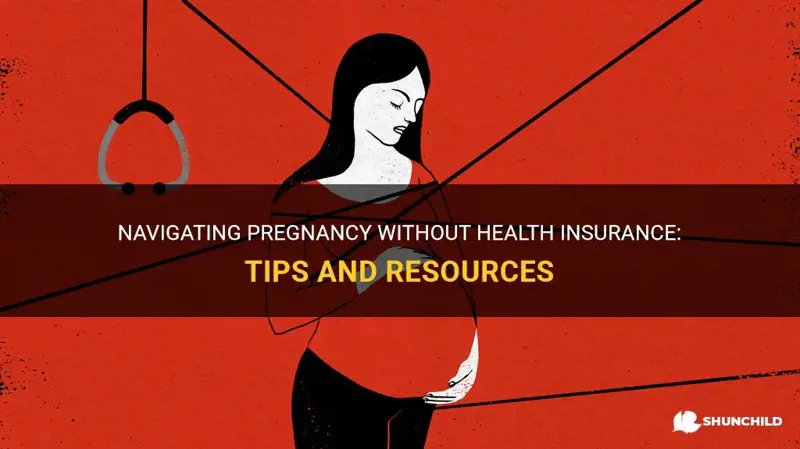
Pregnancy is a beautiful and exciting journey, but it can also come with hefty medical expenses, particularly for those without health insurance. However, there are strategies and options available to ensure that moms-to-be receive proper prenatal care without breaking the bank. From government assistance programs and community resources to negotiating with healthcare providers, this article will delve into the various ways to cover pregnancy costs for those without health insurance. So, if you or someone you know is expecting and doesn't have health insurance, read on to discover how to navigate this important phase of life without compromising on essential medical care.
| Characteristics | Values |
|---|---|
| Medicaid | Low-income pregnant women may qualify for Medicaid coverage. |
| State-specific programs | Some states have their own programs to provide health coverage for pregnant women. |
| Marketplace coverage | Pregnant women can enroll in a health insurance plan through the health insurance marketplace. |
| Maternity insurance riders | Some insurance plans offer maternity insurance riders as optional add-ons. |
| Alternative health-sharing ministries | Some religious-based organizations offer health-sharing ministries that may provide coverage for pregnancy. |
| Family planning clinics | Family planning clinics may provide limited prenatal care services for pregnant women without insurance. |
| Community health centers | Community health centers offer affordable prenatal care and other medical services to low-income individuals. |
| Pregnancy assistance programs | Some states offer programs that provide assistance to pregnant women to cover medical expenses. |
| Hospital financial assistance | Hospitals may offer financial assistance or charity care programs for pregnant women without insurance. |
| Non-profit organizations and charities | Non-profit organizations and charities may offer resources and assistance to pregnant women without insurance. |
| Affordable Care Act (ACA) | The ACA has improved access to maternity and prenatal care for millions of uninsured women. |
| Payment plans and negotiating discounts | Some healthcare providers may offer payment plans or discounts for self-pay patients. |
| Health savings accounts (HSAs) | Setting up a health savings account can help save money for pregnancy-related expenses. |
| Recommended prenatal care | Following recommended prenatal care guidelines can help ensure a healthy pregnancy and reduce healthcare costs. |
| Researching discounts and free resources | Researching available discounts, coupons, and free resources can help reduce the cost of prenatal care. |
| Negotiating self-pay rates with providers | Some healthcare providers may be willing to negotiate lower rates for self-pay patients. |
What You'll Learn
- What options are available for covering pregnancy without health insurance?
- Are there any government assistance programs that can help with the cost of pregnancy and childbirth?
- What are some alternatives to traditional health insurance that may provide coverage for pregnancy?
- Are there any specific clinics or organizations that offer low-cost or free prenatal care and delivery services?
- What steps can be taken to minimize the financial burden of pregnancy without insurance?

What options are available for covering pregnancy without health insurance?
Pregnancy is a crucial time in a woman's life and having access to proper healthcare is essential for the well-being of both the mother and the baby. However, not everyone has health insurance coverage, and the cost of prenatal care and delivery can be overwhelming without it. Thankfully, there are options available for covering pregnancy without health insurance.
- Medicaid: Medicaid is a government health insurance program that provides coverage to low-income individuals and families. Eligibility requirements vary from state to state, but pregnant women generally have higher income limits compared to other individuals. Medicaid covers prenatal care, delivery, and postpartum care, ensuring that pregnant women have access to necessary healthcare services.
- Children's Health Insurance Program (CHIP): CHIP is a state and federal program that provides health coverage to children and pregnant women who do not qualify for Medicaid but cannot afford private health insurance. Eligibility requirements for CHIP also vary by state, but it is worth checking if you are eligible for this program to receive coverage for prenatal care and delivery.
- Pregnancy-specific programs: Some states offer programs specifically designed to provide healthcare coverage for pregnant women who do not have insurance. These programs may cover prenatal care, delivery, and even postpartum care. It is important to research and find out if your state offers such programs and what the eligibility requirements are.
- Free clinics and community health centers: Free clinics and community health centers may provide prenatal care services to low-income individuals and uninsured pregnant women. These facilities may offer prenatal check-ups, ultrasounds, blood tests, and other necessary care throughout the pregnancy. However, it is essential to check their availability, appointment policies, and the services they offer before seeking care.
- Negotiating with healthcare providers: In some cases, healthcare providers may be willing to negotiate the cost of prenatal care and delivery if you explain your situation and lack of insurance coverage. It is worth reaching out to them, discussing your financial situation, and exploring any possible options for reduced cost or payment plans.
- Maternity discount programs: Some hospitals and healthcare providers offer maternity discount programs for individuals without insurance. These programs may provide discounts on prenatal care, delivery, and even postpartum care. It is worth researching if any such programs are available in your area and what the eligibility requirements are.
- Crowdfunding and fundraising: While not a traditional method, crowdfunding platforms and fundraising efforts can help alleviate the financial burden of pregnancy and childbirth without insurance coverage. Sharing your story and reaching out to friends, family, and the community for support can provide necessary funds to cover the cost of prenatal care, delivery, and postpartum care.
Remember, it is important to start exploring these options as early as possible in your pregnancy to ensure you receive the necessary care. The above options can help provide coverage and ensure a healthy pregnancy and delivery, even without health insurance.
How to Naturally Firm Breast Tissue After Pregnancy
You may want to see also

Are there any government assistance programs that can help with the cost of pregnancy and childbirth?
Pregnancy and childbirth can be expensive, and for many families, the costs can be overwhelming. However, there are several government assistance programs that can help alleviate some of the financial burden. These programs are designed to ensure that every pregnant woman has access to quality prenatal care, delivery services, and postpartum care, regardless of their income or insurance status.
One such program is Medicaid. Medicaid is a joint federal and state program that provides health insurance to low-income individuals and families. Eligibility requirements vary from state to state, but pregnant women with income below a certain threshold are generally eligible for Medicaid coverage. Medicaid covers a wide range of medical services related to pregnancy and childbirth, including prenatal care, labor and delivery, and postpartum care. This can greatly reduce the out-of-pocket expenses associated with these services.
Another program that can help with the cost of pregnancy and childbirth is the Children's Health Insurance Program (CHIP). CHIP provides health insurance to children and pregnant women from low-income families who do not qualify for Medicaid. Like Medicaid, CHIP covers prenatal care, delivery services, and postpartum care at little to no cost to the beneficiary. The income eligibility for CHIP is higher than Medicaid, so more families may qualify for this program.
In addition to Medicaid and CHIP, there are also specific programs within the Women, Infants, and Children (WIC) program that can help with the cost of pregnancy and childbirth. WIC provides nutrition education, breastfeeding support, and access to healthy food for low-income pregnant women, new mothers, and young children. By participating in the WIC program, pregnant women can receive nutritious food that can support their health and the health of their unborn child.
Furthermore, some states offer additional programs to assist pregnant women and new mothers. For example, the Special Supplemental Nutrition Program for Women, Infants, and Children (SNAP) provides eligible low-income individuals with a monthly stipend to purchase food. The Maternal and Child Health Services Block Grant program provides funding to states to improve maternal and child health outcomes, including access to prenatal and postpartum care.
To access these government assistance programs, pregnant women can contact their state's Medicaid office, apply online through the Healthcare Marketplace, or visit a local clinic or hospital that participates in these programs. It is important to apply as soon as possible, as there may be eligibility requirements and a verification process that can take time.
In conclusion, there are several government assistance programs available to help with the cost of pregnancy and childbirth. These programs, such as Medicaid, CHIP, WIC, SNAP, and the Maternal and Child Health Services Block Grant program, provide access to prenatal care, delivery services, and postpartum care for low-income individuals and families. By utilizing these programs, pregnant women can receive the necessary medical care and support without the added burden of high costs.
Should You Drink Coffee If You Suspect Pregnancy?
You may want to see also

What are some alternatives to traditional health insurance that may provide coverage for pregnancy?
Traditional health insurance plans can be expensive and may not always provide adequate coverage for pregnancy-related expenses. Fortunately, there are several alternatives to traditional health insurance that may offer coverage for pregnancy. In this article, we will explore some of these alternatives and discuss how they can help expectant parents manage the cost of prenatal care and childbirth.
- Medicaid: Medicaid is a government-sponsored program that provides healthcare coverage for individuals and families with low incomes. Eligibility criteria vary by state, but pregnant women are generally given priority for enrollment. Medicaid covers a range of pregnancy-related services, including prenatal care, delivery, and postpartum care.
- State-run programs: Some states have their own programs for low-income individuals and families who do not qualify for Medicaid. These programs may provide coverage for pregnancy-related care and are typically more affordable than traditional health insurance plans.
- Maternity-specific plans: Some insurance providers offer maternity-specific plans that provide coverage for prenatal care, delivery, and postpartum care. These plans are designed to meet the specific needs of expectant parents and may offer more comprehensive coverage for pregnancy-related expenses compared to traditional health insurance plans.
- Health sharing ministries: Health sharing ministries are faith-based organizations that allow members to pool their resources to cover medical expenses. While these programs are not insurance, they can provide coverage for pregnancy-related care. It's important to note that health sharing ministries may have certain eligibility requirements and may not cover all pregnancy-related expenses.
- High-deductible health plans (HDHP) with a health savings account (HSA): HDHPs are insurance plans with higher deductibles and lower premiums. They can be paired with an HSA, which is a tax-advantaged savings account that can be used to pay for qualified medical expenses. While HDHPs may not provide extensive coverage for routine prenatal care, they can help cover the cost of delivery and other unexpected expenses that may arise during pregnancy.
- Negotiating cash prices: Some healthcare providers may offer discounted rates for patients paying with cash. It may be worth negotiating cash prices with providers for prenatal care, ultrasounds, and other pregnancy-related services. However, it's important to keep in mind that cash prices may still be higher than what insurance providers negotiate with healthcare providers.
In conclusion, there are several alternatives to traditional health insurance that can provide coverage for pregnancy. Medicaid, state-run programs, maternity-specific plans, health sharing ministries, HDHPs with HSAs, and negotiating cash prices are some options that expectant parents can explore. It's important to carefully evaluate each option to determine which one provides the most comprehensive coverage and best fits their individual needs and financial situation.
The Amazing Journey of How a Baby Grows During Pregnancy: An Animated Guide
You may want to see also

Are there any specific clinics or organizations that offer low-cost or free prenatal care and delivery services?
Pregnancy can be an exciting and joyful time in a woman's life, but it also comes with a significant financial burden. Prenatal care and delivery services can be expensive, especially for those who are uninsured or have limited financial resources. However, there are specific clinics and organizations that offer low-cost or even free prenatal care and delivery services to ensure that every woman has access to the care she needs during pregnancy.
One example of an organization that offers low-cost or free prenatal care and delivery services is Planned Parenthood. Planned Parenthood is a nonprofit organization that provides reproductive health services, including prenatal care, to women across the United States. They offer a sliding fee scale based on income, which means that individuals who have lower incomes pay less for their services. Additionally, many Planned Parenthood facilities offer prenatal care through their Title X program, which provides family planning and other reproductive health services to low-income individuals.
Another organization that offers low-cost prenatal care and delivery services is the March of Dimes. The March of Dimes is a nonprofit organization that focuses on improving the health of mothers and babies. They have various programs and initiatives that aim to provide prenatal care and support to women in need. For example, they have a program called "Healthy Babies are Worth the Wait," which focuses on preventing preterm birth through education and support. They also provide resources and information about low-cost or free prenatal care services available in different communities.
In addition to these organizations, there are also specific clinics that offer low-cost or free prenatal care and delivery services. Some examples include community health clinics, federally qualified health centers, and local health departments. These clinics often have programs in place to assist individuals without insurance or with limited financial resources. They may offer discounted services or payment plans based on income. Additionally, they may have partnerships with local hospitals or birthing centers to provide low-cost or free delivery services.
It is important to note that the availability of low-cost or free prenatal care and delivery services may vary depending on the location. While some areas may have multiple options, others may have limited resources. It is recommended to research and contact local clinics or organizations to inquire about the services available in your area.
In conclusion, there are specific clinics and organizations, such as Planned Parenthood and the March of Dimes, that offer low-cost or free prenatal care and delivery services. These organizations aim to ensure that every woman has access to the care she needs during pregnancy, regardless of her financial situation. Additionally, there are community health clinics, federally qualified health centers, and local health departments that also offer low-cost or free services. It is important to research and contact local resources to determine the availability of these services in your area.

What steps can be taken to minimize the financial burden of pregnancy without insurance?
Pregnancy is a wonderful and transformative time in a woman's life, but it can also come with a financial burden, especially if you do not have insurance coverage. However, there are steps you can take to minimize the financial strain and ensure a healthy pregnancy without insurance. Here are some practical tips to consider:
Plan ahead:
If you don't have insurance coverage, it is essential to plan ahead and start saving for pregnancy expenses as early as possible. This will allow you to have a financial cushion to fall back on when unexpected costs arise.
Research available resources:
Look into the various programs and resources available in your area to assist pregnant women without insurance. Many states have Medicaid programs that offer coverage for pregnant women who meet certain income guidelines. Additionally, there are non-profit organizations and clinics that provide free or low-cost prenatal care services.
Seek out discounted or sliding-scale clinics:
Many cities have clinics that offer discounted rates or sliding-scale fees based on income. These clinics can provide prenatal care, ultrasounds, and other necessary screenings at a reduced cost. Research and find a clinic near you that can provide quality care without breaking the bank.
Take advantage of community programs:
Some communities have programs specifically designed for pregnant women without insurance. These programs may offer services such as childbirth classes, breastfeeding support, and even financial assistance for prenatal care and delivery expenses. Explore the resources available in your area and take advantage of them.
Consider midwifery care:
Choosing midwifery care over traditional obstetricians can be a more cost-effective option. Midwives often have lower fees and offer personalized care throughout pregnancy, labor, and delivery. Additionally, midwives tend to have a lower intervention rate, which can reduce overall healthcare costs.
Look into prenatal care packages or payment plans:
Many healthcare providers offer discounted packages or payment plans for prenatal care. These packages typically include a set number of visits, ultrasounds, lab work, and prenatal vitamins at a reduced cost compared to paying for each visit individually. Inquire with your preferred healthcare provider about any available options.
Utilize community-supported resources:
Reach out to local organizations or charities that focus on supporting pregnant women and families in need. These organizations may be able to provide financial assistance, baby supplies, or even help with finding affordable housing options. Don't hesitate to ask for help when needed.
In conclusion, while navigating pregnancy without insurance can be challenging, there are steps you can take to minimize the financial burden. By planning ahead, researching available resources, seeking out discounted clinics, exploring community programs, considering midwifery care, looking into prenatal care packages, and utilizing community support, you can ensure a healthy pregnancy without breaking the bank. Remember that the most important thing during this time is the well-being of you and your baby, and there are resources available to help make that possible, even without insurance coverage.
Does a Baby's Brain Double in Size Late in Pregnancy?
You may want to see also
Frequently asked questions
Yes, you have several options for obtaining health insurance coverage for your pregnancy if you don't already have insurance. You can check if you are eligible for Medicaid, which provides coverage for low-income individuals and families. You can also look into purchasing a private health insurance plan, either through the healthcare marketplace or directly from insurance providers. Additionally, you may qualify for a special enrollment period if you recently had a life event, such as getting married or losing your job.
If you don't qualify for Medicaid and can't afford a private insurance plan, you may still be able to receive prenatal care and other necessary medical services through programs like the Children's Health Insurance Program (CHIP) or community health clinics. These programs often provide free or low-cost healthcare services for pregnant women or individuals with limited financial resources.
If you are unable to find affordable options for pregnancy coverage, you should reach out to local healthcare providers, social service organizations, or your state's department of health to inquire about any pregnancy assistance programs that may be available. These programs can help connect you with resources and support services to ensure you receive the necessary care during your pregnancy.
Yes, in most cases, you can still apply for health insurance coverage for your pregnancy even if you are already pregnant. However, it's important to note that certain health insurance plans may have waiting periods before you can access maternity benefits. It's recommended to research and compare different plans to find the best option for your situation.
While not having health insurance coverage for your pregnancy may result in you being responsible for some of the costs, there are still options available to help minimize the financial burden. Many healthcare providers offer sliding scale fees based on income for services provided to uninsured individuals. Additionally, hospitals may have financial assistance programs that can help alleviate the costs associated with childbirth. It's important to communicate with your healthcare providers and hospital about your financial situation to explore all available options for assistance.







